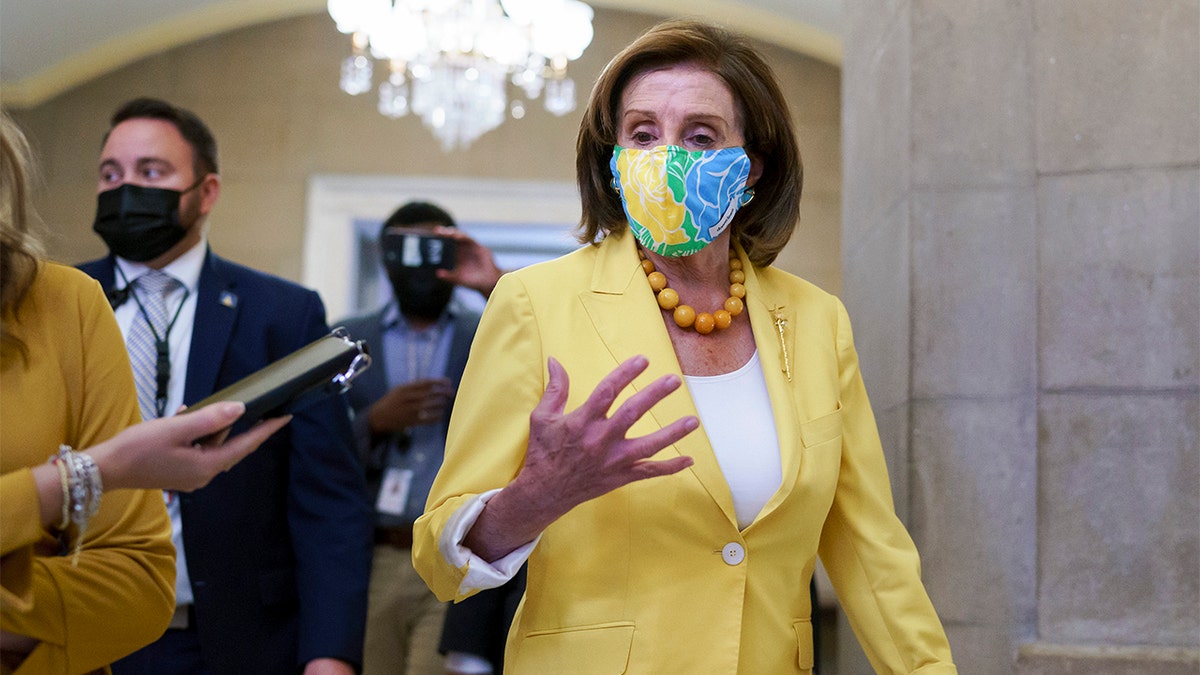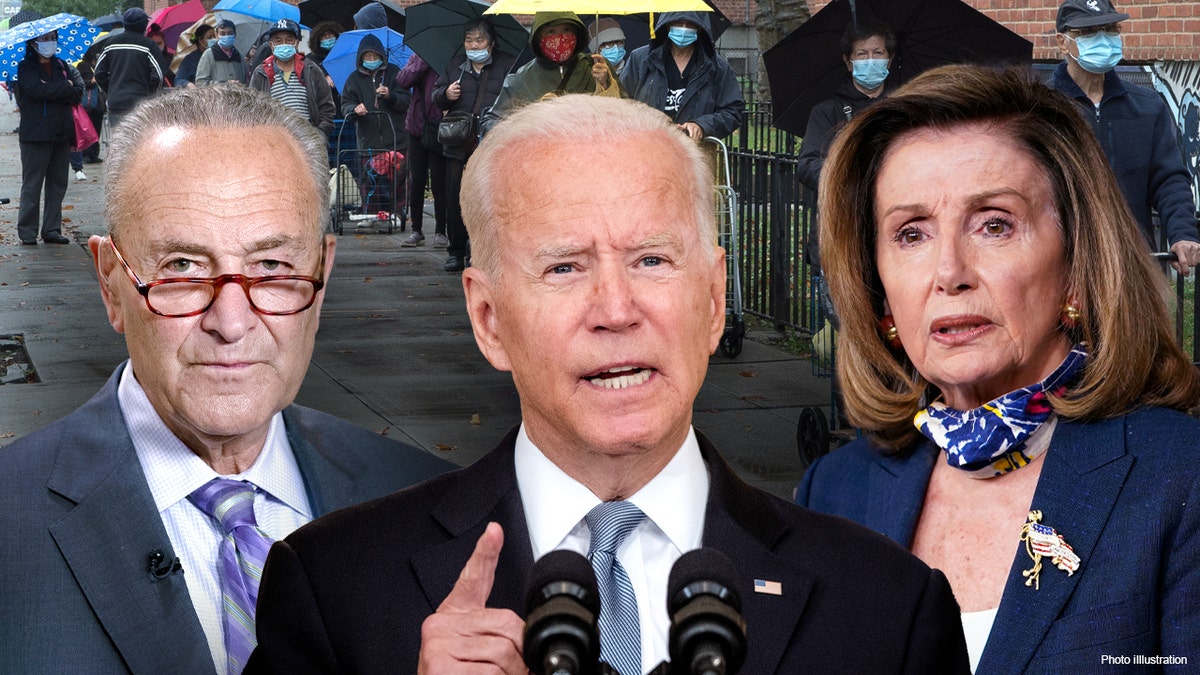Fox News Flash top headlines for September 23
Fox News Flash top headlines are here. Check out what's clicking on Foxnews.com.
I have learned one thing from covering House Speaker Nancy Pelosi D-Calif., over the years: many of her public comments and appearances aren’t necessarily designed for consumption by the press corps or the public.
When a big bill is on the line, or, in the next few days, several big bills (debt ceiling, government shutdown, social spending bill, infrastructure package), Pelosi tailors her public comments to a very specific audience: House Democrats whom she needs to court to secure their votes.
Pelosi wheeled in Senate Majority Leader Chuck Schumer D-N.Y., and Treasury Secretary Janet Yellen to her weekly press conference Thursday morning. Yellen didn’t utter a sound. Schumer only gave a vague statement and then left.
"I have a brief, brief sentence, and that is that the White House, the House and the Senate have reached agreement on a framework that will pay for any final negotiated agreement. So the revenue side, this we have an agreement on. OK, thank you. it's a framework an agreement of a framework agreement," said Schumer.
His comment lasted fewer than 30 seconds. This was remarkable for Schumer. There’s an old saw that "the most dangerous place in Washington is between Schumer and television camera." Not Thursday. Schumer’s hasty exit was strange. But it didn’t matter. Pelosi, Schumer, and the Biden Administration secured the exact "sightbite" they wanted: Democrats were united when it comes to the social spending bill. There was hope that such an image would resonate with Democratic House and Senate members who are trying to figure out what’s coming on the social spending plan. Democrats are all over the map on what they want on that bill. So, if you don’t have a deal in politics, you engage in stagecraft. You give the illusion of a deal. And, Pelosi hoped the message would resonate with her target demographic: House Democrats.
Reporters demanded to know exactly what Schumer referred to as he and Yellen abruptly left the dais in the House Radio/TV Gallery, allowing the Speaker to continue with the remainder of his press conference. Schumer didn’t answer. But Pelosi later offered some clarity. The Speaker said there was "an agreement on how we can go forward in a way to pay for this." Pelosi added, "we wanted to make sure it was paid for."

Speaker of the House Nancy Pelosi, D-Calif., leaves the chamber after urging advancement of the John Lewis Voting Rights Advancement Act, named for the late Georgia congressman who made the issue a defining one of his career, at the Capitol in Washington, Tuesday, Aug. 24, 2021. (AP Photo/J. Scott Applewhite) (AP Photo/J. Scott Applewhite)
She noted that some House Democrats may want a more expensive bill. Others may want a cheaper version. But, regardless, the social spending plan would be paid for.
And there you have it: that was the message Pelosi was hoping to propound to House Democrats.
DEMS QUIETLY RESTRICT GOP ABILITY TO INVESTIGATE WHITE HOUSE ACTIONS ON AFGHANISTAN, BORDER CRISIS
I interviewed John Lawrence, Pelosi’s former Chief of Staff Thursday morning about an hour before the press conference. I was trying to get a sense from Lawrence of what Pelosi needed to do over the next week or so with these major issues coming down the pike at the same time.
"She is a master of the political philosophy of Sir Mick Jagger. That great, British, political scientist who said ‘You can’t always get what you want. But you get what you need," said Lawrence, invoking the famous lyric from the Rolling Stones. "She has an extraordinary capacity for figuring out what people need as opposed to what they want and knitting it together."
In other words, Pelosi has gotten an earful from different factions in her caucus over the past few weeks about what they "want." More spending. Less spending. Vote on infrastructure on September 27. Vote on the social spending bill soon. Add health care provisions. Get immigration reform into the bill. You name it. Those are a lot of "wants." But what Pelosi is focusing on, to move the social spending bill is what Democratic members "need." Therefore, the point Pelosi needed to make at her press conference was that House Democrats "need" a bill that is paid for.

Senate Minority Leader Chuck Schumer, a Democrat from New York, participates in a television interview at the Russell Senate Office building in Washington D.C., U.S. on Wednesday, Sept. 9, 2020. Congressional leaders hardened their battle lines on additional fiscal stimulus on Tuesday, with House Speaker Nancy Pelosi labeling Republican Senate Majority Leader Mitch McConnell's proposal for a slimmed-down package "fraudulent." Photographer: Stefani Reynolds/Bloomberg via Getty Images ________ Washington, DC - August 16: President Joe Biden delivers remarks on the situation in Afghanistan in the East Room of the White House, in Washington, DC. (Photo by Bill O'Leary/The Washington Post via Getty Images) _____ Nancy Pelosi via AP images (Photo by Bill O'Leary/The Washington Post | Stefani Reynolds/Bloomberg | AP newsroom)
And, with assists from Schumer and Yellen, Pelosi reached her target audience Thursday morning.
What’s unclear is how Democrats proceed on the bipartisan infrastructure bill. Moderate Democrats cut a deal with Pelosi weeks ago that the House would vote before or on September 27 on infrastructure. A senior House source with ties to the moderate "Blue Dogs" tells Fox that those centrists are probably okay with the vote on infrastructure slipping a few days. But not much. Otherwise, the relationship between Pelosi and moderates calcifies. That means there’s wiggle room there for Pelosi.
Pelosi knows that short window is not only what she "needs" but what Blue Dogs "need," compared to what they "want." The "want" is a vote on September 27. So Pelosi opened the door to the vote sliding.
"With the announcement of this framework, are you confident that you have enough support within your own party to move forward with a vote Monday," asked Rachel Scott of ABC News.
"We take it one day at a time," replied Pelosi. "I’m confident that we will pass both bills."
There it was. Both wings of the Democratic Caucus getting what they "need" compared to what they "want."
This begs the question as to whether or not Pelosi would put the infrastructure bill on the floor and watch it fail if progressives yank their support. Progressive Caucus Chairwoman Rep. Pramila Jayapal, D-Wash., has suggested that up to 45 of her 96 members could vote no on the infrastructure package if there aren’t assurances on the social spending plan. Fox is told the number of progressive noes is closer to 15. But that’s still enough to tank the bill.
Pelosi historically says she won’t "go to the floor and lose" on bills.
So, it’s doubtful that Pelosi would put a bill on the floor which wasn’t ready for passage.
"Phil Burton, who was one of her predecessors in the seat in San Francisco used to say ‘If you show them the depths of hell, then whatever remains, looks a lot better,’" said John Lawrence.
So, a failure of a bill on the floor is one way to reveal "the depths of hell" to both sides. But Lawrence suggests the true "depths of hell" is showing members that they get neither infrastructure nor the social spending package – and probably undercut President Biden’s signature achievements in the process. So, putting a vote on the floor to fail is unlikely.
So when will the House vote on both of these bills? Probably quickly once the Speaker secures the votes. Lawrence suggests the Speaker will pass the bills with narrow margins. And they won’t wait over a weekend or something. Lawrence recounted that when he was Pelosi’s Chief of Staff, he once suggested putting off a vote on a major bill until over the weekend. Instead, Pelosi wanted to vote on Sunday.
CLICK HERE TO GET THE FOX NEWS APP
"She looked at me incredulously and said ‘somebody could have a heart attack by Monday. Somebody could get hit by a bus on Monday,’" said Lawrence.
So, the House voted on Sunday.
And Pelosi needs to move quickly this time, with only a three-vote margin to pass bills in the House.














































